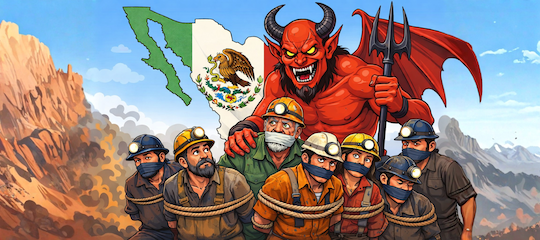
Posted December 22, 2023
By Sean Ring
Can The Houthi Horse Bring Down the Walls of DC?
On our editorial call on Wednesday, ex-naval aviator and Paradigm’s venerable historian Byron King mentioned something I hadn’t considered.
Byron said - and I’ll paraphrase - that the Houthis were using $100,000 drones to attack commercial shipping in the Red Sea, while the US Navy was using $1 - 4 million rockets to shoot those drones down.
You don’t need a mathematics degree to see why experts think this unbalanced exchange of munitions will eventually pressure the Pentagon.
Before I go on, I must warn you that I’m neither a classicist nor a military man.
And though the parallel isn’t exact, this exchange reminded me of a story in The Iliad.
Why I Read The Iliad
When Micah was born, some of my shortcomings were thrown into sharp relief.
For instance, I took a Krav Maga class to learn how to defend my family. That martial art is fascinating. Though I’m no expert, just learning how to strike, block, and run (yes, run away) was worth its weight in gold.
I also realized that if I were to pass down some of Western Civilization’s greatest gifts, I needed to read more.
The Iliad and The Odyssey were glaring omissions from my library. And since they were meant to be oral tales, I had no guilt in listening to the Audible versions. I highly recommend the Dan Stevens versions.
Though The Iliad is about The Trojan War, and The Odyssey is about Odysseus’ circuitous voyage home from the war, both books’ messages are unabashedly anti-war.
Homer accomplishes this in a couple of ways.
First, that the war would be fought over Helen is ridiculous in and of itself. We see Agamemnon happily back his brother, Menelaus, because he wants the war anyway, not because he’s trying to get his sister-in-law home.
It is fascinating that Helen appears at Menelaus’ side in Sparta when Telemachus searches for his father in the Telemachy (the first four books of The Odyssey). After ten years, she hates Paris and wants to return to Sparta.
They didn’t teach us that, did they?
Second, in Book XI of The Odyssey, when Odysseus visits the Underworld and sees the mighty warrior Achilles there, Achilles says, “‘Say not a word,’ he answered, ‘in death's favor; I would rather be a paid servant in a poor man's house and be above ground than king of kings among the dead.”
Third, Homer establishes fatherhood as necessary. He does this at the beginning of The Odyssey by making Telemachus a mealy-mouthed wimp because he is bereft of his father’s guidance his whole life. He also rightly holds Odysseus responsible for the loss of two generations of Ithacan fathers (the men he brought with him to Troy and the suitors, the sons of the men he brought to Troy, whom he killed for trying to marry his wife). Only by Athena’s deus ex machina intervention is Odysseus not lynched in Ithaca when he returns.
But there’s another way Homer demonstrates the idiocy of war.
Glaucus and Diomedes Exchange Armor
To shorten the passage, I’ll explain: When Diomedes (Greek) first saw Glaucus (Trojan) on the battlefield, Diomedes thought he was a god and didn’t want to fight him. Glaucus then tells Diomedes his family history. Diomedes replies:
Thus did he speak, and the heart of Diomedes was glad. He planted his spear in the ground, and spoke to him with friendly words. “Then,” he said, “you are an old friend of my father's house. Great Oeneus once entertained Bellerophon for twenty days, and the two exchanged presents. Oeneus gave a belt rich with purple, and Bellerophon a double cup, which I left at home when I set out for Troy. I do not remember Tydeus, for he was taken from us while I was yet a child, when the army of the Achaeans was cut to pieces before Thebes. Henceforth, however, I must be your host in middle Argos, and you mine in Lycia, if I should ever go there; let us avoid one another's spears even during a general engagement; there are many noble Trojans and allies whom I can kill, if I overtake them and heaven delivers them into my hand; so again with yourself, there are many Achaeans whose lives you may take if you can; we two, then, will exchange armor, that all present may know of the old ties that subsist between us.”
With these words, they sprang from their chariots, grasped one another's hands, and plighted friendship. But the son of Saturn made Glaucus take leave of his wits, for he exchanged golden armor for bronze, the worth of a hundred head of cattle for the worth of nine.
Not a great trade, is it?
Now, I don’t expect any American sailors and Houthi soldiers to claim their grandfathers know each other and call a truce. But Glaucus, of rich Troy, giving away armor at 10x the cost of Greek armor rings a bell.
In fact, some of the aforementioned American rockets are 40x as expensive as the Houthi drones. Dumb.
The Walls of Troy Finally Fall
The Trojan Horse is as familiar to everyone as any story can be.
And yet we fall for it over and over again. Whether it’s porous borders, easy visa programs, or a prolifigate welfare state, we’ve become our own worst enemy.
We don’t even make the enemy build the horse anymore. We just open the gates to everyone.
In this case, our overseas adventures, which serve no real American purpose, are draining the treasury faster than when Romans overspent on Asian silks or Brits on that peerless herb, tea.
Man-bunned demographers claiming that the cheap armaments aren’t a problem miss the point. You can outspend your enemy so much that you wind up bankrupting yourself.
“But we can print money!”
Sure, we can… until we can’t.
Wrap Up
This edition is the last original Rude of the year. But next week, I’m serving up the greatest hits.
Please look, as they may clear up some cobwebs you may have.
I’ll return on Tuesday, January 2nd, for a new, original Rude.
Until then, please have a Merry Christmas and a Happy New Year!

How Options Boss Stocks
Posted February 20, 2026
By Nick Riso

Investing is So Taxing!
Posted February 19, 2026
By Sean Ring

The Most Expensive Way to Go Broke
Posted February 18, 2026
By Sean Ring

The Bears Gather
Posted February 17, 2026
By Sean Ring

Omar Khayyam: Poet, Rebel, Astronomer
Posted February 16, 2026
By Sean Ring

